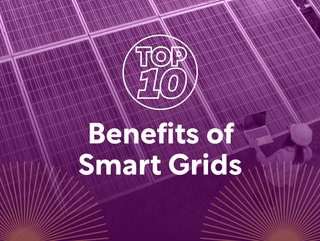
In the words of the International Energy Agency (IEA), smart grids are electricity networks that use digital technologies, sensors and software to better match the supply and demand of electricity — in real time — while minimising costs and maintaining the stability and reliability of the grid.
They play an important role in the energy transition, as this process requires large increases in electricity demand and the widespread rollout of variable renewables, like wind and solar. This, in turn, places a greater demand on power grids.
This is where smart grids come in. The technologies involved in smart grids are key to managing the transition and do so while also reducing the need for costly new grid infrastructure, adding resiliency and reliability.
Among the leading smart grid companies are Cisco, Siemens, IBM, Schneider Electric and GE.
Smart grids offer numerous benefits compared to traditional electrical grids. Here, we run through some of the key advantages.
10. Better integration of customer-owner power generation systems, including renewable energy systems
Thanks to smart grids, customer-owned power generation systems can be seamlessly integrated. Benefitting from bidirectional communication, real-time monitoring and dynamic adjustments based on grid conditions, utility companies have visibility of distributed energy resources. In simple terms, smart grids allow people to produce their own electricity, for example via roof-fitted solar panels, and with smart grids both the power company and those producing the renewable electricity can see how much electricity is being made and used in real-time. Benefits of this include better management of electricity, money savings and reliability.
9. Increased integration of large-scale renewable energy systems
As well as facilitating the optimisation of utilising renewable energy sources, smart grids also enhance grid flexibility to accommodate the variability of renewable energy generation. Because of the fluctuating nature of renewables like solar and wind — which depend on the availability of sun and optimum wind power — smart grids ensure the smooth integration of renewable energy with more conventional power sources and secure its efficiency, too.
8. Reduced peak demand
Smart grids are able to reduce peak energy demands, which, in turn, also help lower electricity rates. McKinsey research states the next generation of smart grids will enable customers to make more informed decisions about their energy consumption. Smart grids reduce peak demand by implementing demand response programmes, which encourage consumers to reduce usage during peak periods. This, along with load shifting, energy storage and grid optimisation and automation, alleviates pressure on the grid, which boosts reliability and efficiency while reducing costs associated with peak demand.
7. More efficient transmission of electricity
The IEA advocates that smart grids ensure electricity transmission is more efficient. This is thanks to smart grids’ use of digital technologies, sensors and software, which match the supply and demand of electricity in real-time. For example, IBM facilitates the optimisation of the smart grid, with the technology giant endorsing that to really maximise the benefits of a smart grid, power companies must implement effective optimisation strategies, such as advanced analytics, predictive maintenance, distributed energy resources (DERs), cybersecurity and data privacy measures, grid resilience via microgrids, energy storage and grid automation.
6. Quicker restoration of electricity after power disturbances
Thanks to two-way interactive capacity, smart grids can allow for automatic rerouting when equipment fails or outages occur. Because of this, outages are minimised, as are the effects of them if they ever do happen. This is ensured also via automated monitoring, remote control and predictive analytics. National Electrical Manufacturers Association (NEMA) shares how smart grids can minimise interruptions during an extreme weather event by effectively managing unplanned outages as well as enhancing the restoration of energy infrastructure after a storm, lessening the impact on human life and critical infrastructure.
5. Security
By employing robust cybersecurity measures, smart grids bolster security by safeguarding against cyber threats and unauthorised access. Smart grids modernise existing infrastructure, which further reinforces and enhances security, while the integration of distributed energy resources reduces vulnerability. Thanks to the advanced monitoring, encryption and access controls which comprise smart grids’ makeup, the systems can offer improved security. This is because real-time monitoring detects anomalies, while encryption safeguards sensitive data. However, Infosys emphasises the critical importance of cybersecurity in smart grid systems due to their vulnerability to various attacks. With this in mind, the IT consultancy suggests a multi-layered defence approach to mitigate security risks and ensure the reliability and resilience of energy infrastructure.
4. Reduced operations and management costs for utilities and ultimately lower power costs for consumers
Smart grids reduce operations and management costs for utilities, and, as a result, this reduction can be passed on to customers. This is achieved by optimising resource allocation, enabling remote monitoring and control and implementing predictive maintenance. Saying that there are some additional costs associated with smart grids, including the need to replace components such as smart meters, but these minor costs outweigh the overall savings benefits — which include increased efficiency, reliability and the integration of renewable energy sources. Smart Energy International foresees that technological advancements are likely to reduce the costs of components over time.
3. Green
In a purely green system, a variety of green benefits come from smart grids, with optimised energy distribution and consumption among them. As smart grids integrate renewable energy sources efficiently, reduced reliance on fossil fuels comes about as a result, lowering carbon emissions. Because of demand response programmes and load management, smart grids encourage energy conservation during peak periods, therefore promoting sustainability. By enhancing grid efficiency and supporting clean energy initiatives, smart grids contribute to a greener, more sustainable energy future.
2. Sustainability
Leading on from the above green points, smart grids’ sustainability benefits come from optimising energy usage and reducing environmental impact. This is because of its ability to integrate renewable energy sources effectively, lowering carbon emissions and promoting cleaner energy generation. This is one of the main sustainability credentials for smart grids, as the grids themselves do not produce any emissions and help other systems lower theirs. As well as this, smart grids support the adoption of EVs and decentralised energy generation, which is a huge part of further reducing reliance on fossil fuels.
1. Reliability
Smart grids can significantly enhance grid reliability because of real-time monitoring, fault detection and self-healing capabilities. Many of the points on reliability have already been laid out across this Top 10, but it's worth highlighting again that smart grid reliability ensures uninterrupted electricity supply, and is able to detect and mitigate faults in real-time. Reliability improves customer satisfaction, reduces economic losses and boosts business productivity.
Hassan Mehmood, a Functional Consultant at Indra, said: “Smart grids are a game-changer when it comes to grid reliability. They introduce real-time monitoring, predictive maintenance and self-healing capabilities, which collectively minimise outages and reduce downtime. This translates to a remarkable enhancement in overall grid resilience.
“In my experience, smart grids not only significantly improve reliability but also ensure a more stable energy distribution. Embracing these innovative technologies is crucial for building a more robust and efficient energy infrastructure, delivering uninterrupted power to consumers.”
******
Make sure you check out the latest edition of Energy Digital and also sign up to our global conference series - Sustainability LIVE 2024
******
Energy Digital is a BizClik brand






